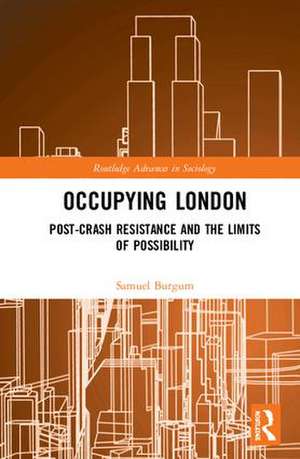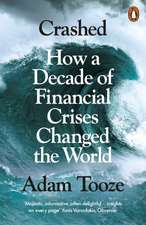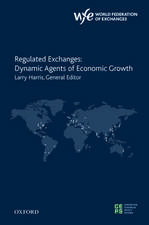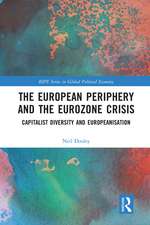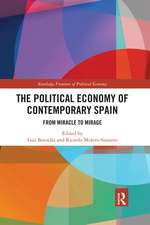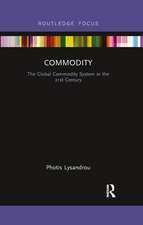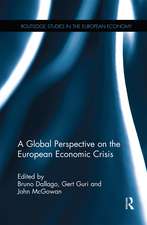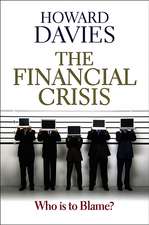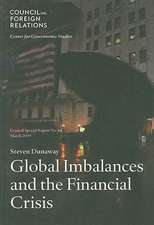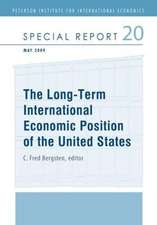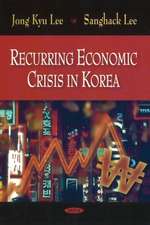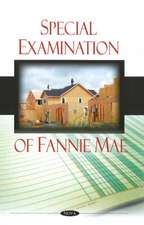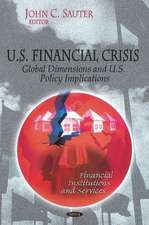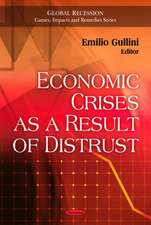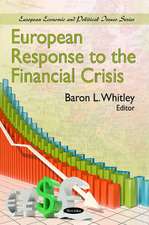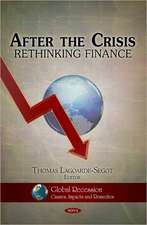Occupying London: Post-Crash Resistance and the Limits of Possibility: Routledge Advances in Sociology
Autor Samuel Burgumen Limba Engleză Hardback – 28 iun 2018
Offering a critically constructive analysis of the Occupy movement in London and incorporating both activist praise and self-criticism of their movement, Occupying London discusses both the political potential suggested by the occupation of space and the slogan ‘we are the 99%’, as well as the problematic extension of post-crash normativity into the movement through issues of organisation, repetitions of wider norms, and an inadvertent acceptance of wider distributions of possibility. Such positives and negatives are shown to have played out in a wide-range of arenas: from the occupation of space itself, through attempts to organise collective appearance and voice, as well as ‘authentic’ constructions of resistance and ‘cynical’ framings of power.
The author’s intention is to provoke thought on behalf of any ‘half-fascinated, half-devastated witnesses’ of the financial crash and the political disappointments which followed. It is argued that such movements possess the potential to bring about progressive change, but only if they intervene into wider distributions of ‘common sense’ by embracing collective symbolic efficiency and avoiding binary framings of ‘authentic’ resistance vs. ‘hidden’ power.
| Toate formatele și edițiile | Preț | Express |
|---|---|---|
| Paperback (1) | 382.91 lei 6-8 săpt. | |
| Taylor & Francis – 7 oct 2019 | 382.91 lei 6-8 săpt. | |
| Hardback (1) | 763.89 lei 6-8 săpt. | |
| Taylor & Francis – 28 iun 2018 | 763.89 lei 6-8 săpt. |
Din seria Routledge Advances in Sociology
-
 Preț: 385.10 lei
Preț: 385.10 lei -
 Preț: 152.38 lei
Preț: 152.38 lei -
 Preț: 309.12 lei
Preț: 309.12 lei - 20%
 Preț: 290.36 lei
Preț: 290.36 lei -
 Preț: 326.49 lei
Preț: 326.49 lei -
 Preț: 204.46 lei
Preț: 204.46 lei - 9%
 Preț: 865.97 lei
Preț: 865.97 lei -
 Preț: 317.19 lei
Preț: 317.19 lei -
 Preț: 326.40 lei
Preț: 326.40 lei -
 Preț: 311.41 lei
Preț: 311.41 lei - 8%
 Preț: 388.97 lei
Preț: 388.97 lei -
 Preț: 288.80 lei
Preț: 288.80 lei -
 Preț: 311.33 lei
Preț: 311.33 lei -
 Preț: 311.41 lei
Preț: 311.41 lei -
 Preț: 303.42 lei
Preț: 303.42 lei -
 Preț: 301.50 lei
Preț: 301.50 lei -
 Preț: 329.09 lei
Preț: 329.09 lei -
 Preț: 152.29 lei
Preț: 152.29 lei -
 Preț: 311.41 lei
Preț: 311.41 lei -
 Preț: 309.94 lei
Preț: 309.94 lei -
 Preț: 316.13 lei
Preț: 316.13 lei -
 Preț: 152.99 lei
Preț: 152.99 lei -
 Preț: 326.49 lei
Preț: 326.49 lei -
 Preț: 309.46 lei
Preț: 309.46 lei -
 Preț: 386.77 lei
Preț: 386.77 lei - 8%
 Preț: 388.91 lei
Preț: 388.91 lei -
 Preț: 310.60 lei
Preț: 310.60 lei -
 Preț: 310.22 lei
Preț: 310.22 lei -
 Preț: 310.51 lei
Preț: 310.51 lei -
 Preț: 283.77 lei
Preț: 283.77 lei -
 Preț: 311.41 lei
Preț: 311.41 lei -
 Preț: 295.09 lei
Preț: 295.09 lei - 8%
 Preț: 383.57 lei
Preț: 383.57 lei - 18%
 Preț: 1111.55 lei
Preț: 1111.55 lei -
 Preț: 445.38 lei
Preț: 445.38 lei - 18%
 Preț: 704.48 lei
Preț: 704.48 lei - 18%
 Preț: 1053.92 lei
Preț: 1053.92 lei - 18%
 Preț: 1002.36 lei
Preț: 1002.36 lei - 18%
 Preț: 1057.89 lei
Preț: 1057.89 lei - 16%
 Preț: 248.31 lei
Preț: 248.31 lei - 18%
 Preț: 1003.30 lei
Preț: 1003.30 lei - 18%
 Preț: 1109.21 lei
Preț: 1109.21 lei - 18%
 Preț: 997.11 lei
Preț: 997.11 lei - 18%
 Preț: 1061.22 lei
Preț: 1061.22 lei - 18%
 Preț: 1058.06 lei
Preț: 1058.06 lei - 18%
 Preț: 1002.36 lei
Preț: 1002.36 lei - 18%
 Preț: 1113.12 lei
Preț: 1113.12 lei
Preț: 763.89 lei
Preț vechi: 1027.22 lei
-26% Nou
Puncte Express: 1146
Preț estimativ în valută:
146.20€ • 152.04$ • 122.34£
146.20€ • 152.04$ • 122.34£
Carte tipărită la comandă
Livrare economică 15-29 martie
Preluare comenzi: 021 569.72.76
Specificații
ISBN-13: 9781138291539
ISBN-10: 1138291536
Pagini: 184
Dimensiuni: 156 x 234 x 16 mm
Greutate: 0.44 kg
Ediția:1
Editura: Taylor & Francis
Colecția Routledge
Seria Routledge Advances in Sociology
Locul publicării:Oxford, United Kingdom
ISBN-10: 1138291536
Pagini: 184
Dimensiuni: 156 x 234 x 16 mm
Greutate: 0.44 kg
Ediția:1
Editura: Taylor & Francis
Colecția Routledge
Seria Routledge Advances in Sociology
Locul publicării:Oxford, United Kingdom
Public țintă
Postgraduate and UndergraduateCuprins
Introduction: Now Is the Winter of Our Discount Tents!
1. What Is Our One Demand?
2. Whose Streets? Our Streets!
3. We Are The 99%
4. This Is What Democracy Looks Like
5. They Owe Us
Conclusion: This Is Not a Protest, It’s a Process
1. What Is Our One Demand?
2. Whose Streets? Our Streets!
3. We Are The 99%
4. This Is What Democracy Looks Like
5. They Owe Us
Conclusion: This Is Not a Protest, It’s a Process
Notă biografică
Sam Burgum is a Leverhulme Research Fellow at the Department of Urban Studies and Planning, University of Sheffield, conducting research into squatting in the context of London’s housing crisis. You can follow Sam on Twitter (@sjburgum) or read more about the project at: samuelburgum.uk
Recenzii
"Sam Burgum’s ethnography of the Occupy movement’s longest enduring encampment at Finsbury Square explains not only why the movement failed but what its failure means nearly a decade after the movement’s end. Occupy held out the possibility of change but it didn’t change our sense of the possible. Instead, its emphases on individualism, libertarianism, and identity reaffirmed core tenets of neoliberalism and reinvigorated accompanying racisms and nationalisms. This important work is crucial reading for anyone interested in contemporary political theory, social movements, and the need for progressive change."
- Jodi Dean, author of Crowds and Party
"Occupying London gets inside the movement that believed there is an alternative to the excesses, inequalities and moral blankness of the world we inhabit. Through meticulous fieldwork Burgum offers a balanced and reflective assessment of the protest and those involved in it. This book raises important questions about the limits of resistance, social imagination and a system that, despite our anger and dissatisfaction with it, we are apparently unable to see beyond."
- Professor Rowland Atkinson, Chair in Inclusive Societies, University of Sheffield
"This outstanding book draws on fieldwork with Occupy (in) London to consider the possibility of resisting neoliberalism in the post-crisis period. It centres on the curtailment of politics by neoliberal precepts that operate as ‘common sense’, and offers a vital contribution to our understanding of this problem and how we might move beyond it."
- Professor Nicholas Gane, Department of Sociology, University of Warwick
"In October 2011, tents appeared in central London as Occupy took up its place in the city, and protestors articulated a widespread and angry confusion as to why and how capitalism retained such a grip despite the financial crash and crunch of 2007/8. Through vivid description and careful attention to the voices of the protestors, Sam Burgum takes his readers to the Occupy London encampments, sharing the stories he was told and the experiences he shared. He offers us an honest, unromantic account, capturing the hope and excitement of the movement as well as its disappointments and failures. Anyone interested in the possibilities and challenges of political resistance should read this book."
- Dr Cath Lambert, Associate Professor of Sociology, University of Warwick
- Jodi Dean, author of Crowds and Party
"Occupying London gets inside the movement that believed there is an alternative to the excesses, inequalities and moral blankness of the world we inhabit. Through meticulous fieldwork Burgum offers a balanced and reflective assessment of the protest and those involved in it. This book raises important questions about the limits of resistance, social imagination and a system that, despite our anger and dissatisfaction with it, we are apparently unable to see beyond."
- Professor Rowland Atkinson, Chair in Inclusive Societies, University of Sheffield
"This outstanding book draws on fieldwork with Occupy (in) London to consider the possibility of resisting neoliberalism in the post-crisis period. It centres on the curtailment of politics by neoliberal precepts that operate as ‘common sense’, and offers a vital contribution to our understanding of this problem and how we might move beyond it."
- Professor Nicholas Gane, Department of Sociology, University of Warwick
"In October 2011, tents appeared in central London as Occupy took up its place in the city, and protestors articulated a widespread and angry confusion as to why and how capitalism retained such a grip despite the financial crash and crunch of 2007/8. Through vivid description and careful attention to the voices of the protestors, Sam Burgum takes his readers to the Occupy London encampments, sharing the stories he was told and the experiences he shared. He offers us an honest, unromantic account, capturing the hope and excitement of the movement as well as its disappointments and failures. Anyone interested in the possibilities and challenges of political resistance should read this book."
- Dr Cath Lambert, Associate Professor of Sociology, University of Warwick
Descriere
Just because there has been a crisis does not necessarily mean there is going to be a change. And yet why, exactly, did nothing change in the face of global resistances and movements which followed the financial meltdown of 2007/8? Based on ethnographic research with the Occupy movement in London – as a case study of one post-crash attempt to bring alternatives about – this book argues that change was ultimately foreclosed by widespread ‘common sense’ limitations of what was considered possible after the crash.
